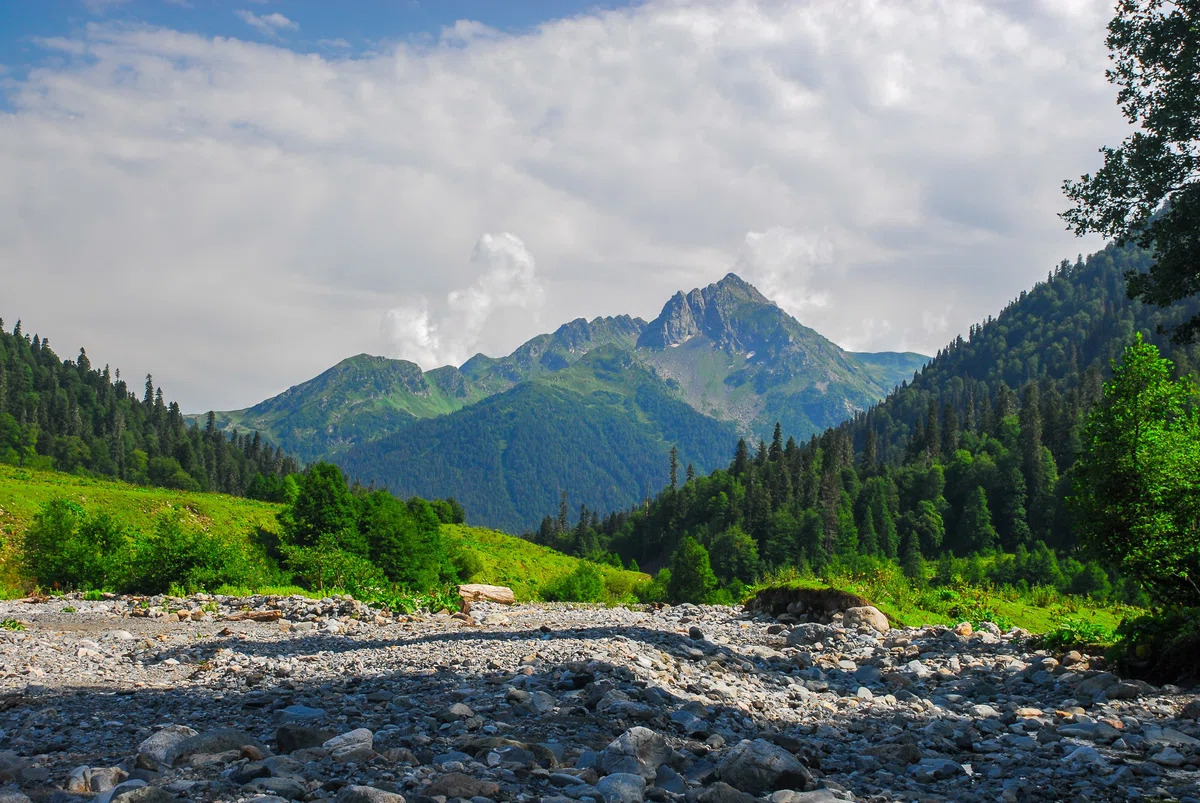
The best resorts of Abkhazia. Avadhara Resort.
The peculiarity of Avadhara resort is that it is characterized by untouched pristine nature. The clean air here is conducive to revitalization. Only here you can take a break from the city dustiness. Avadhara is surrounded by mountains and coniferous forests. Be sure to visit this resort.
17 km northeast of Lake Ritsa, in the center of the reserve is a climatic-balneological resort Avadhara. The resort is distinguished by its pristine nature. Here the air is clean and the rivers are fast and clear. Avadhara is surrounded by mountains covered with spruce, fir and beech forests. In the upper part of the mountains there are subalpine meadows.
AVADHARA RESORT
Several kinds of mineral water springs have been found in Avadhara. The waters flow out of tectonic clefts and mix with carbon dioxide escaping from volcanic rocks.
As a result of complex physical and chemical processes occurring between the water and the rocks, the springs are enriched with various substances and come to the surface in more than 20 locations.
One of the springs, which was investigated by the famous balneologist Alexander Grigolia, and which is called "Ritsa number 4", gives 6 thousand liters of water in a day.
To the northeast of Avadkhar, through the pass Anchkho, there is a road leading to the State Reserve Pskhu-Gumista. Here are the mountain villages of Abkhazia Pskhu and Dam-Khutsi. These villages are interesting from an ethnographic point of view.
Local highlanders to this day keep two-voiced songs, which are performed to the accompaniment of traditional musical instruments - acharpani and apkhiats.
The acharpani was a popular instrument with local shepherds. Abkhazian highlanders attributed magical powers to this instrument. It has survived only in the villages of the Gumista Valley.
According to the local pagan religion, there are seven sacred places on the territory of Abkhazia that protect their land. One of them, Mount Inal-Kuba, towers over Pskhu.
Location: the southern spur of the Main (watershed) Caucasus Range, the Avadkhara river valley.
Distance: from Tbilisi - 560 km, from Gudauta - 75 km, from Sukhumi - 115 km.
Height above sea level: 1700 m.
Relief: mountainous.
Climate: typical for the upper belt of the middle mountains. Winter is long, cold and snowy. Average temperature in January -6.7°C. Summer is short and moderately cool. The hottest month is July. Average temperature in July 13.8°C.
Average annual rainfall: 2480 mm.
Average relative humidity per year: 80%.
Duration of sunshine per year: 1900 hours.
Natural healing factors: climate of the upper belt of the middle mountains. Carbonic, boric, iron, hydrocarbonate, sodium mineral water with total mineralization 5,9-17,7 g/dm³ and carbonic, hydrocarbonate, sodium-calcium (magnesium-calcium) mineral water with total mineralization 0,4-7,2 g/dm³.
Types of treatment: internal consumption of mineral waters, passive climatotherapy.
Therapeutic indications: diseases of the cardiovascular and digestive systems (chronic gastritis, gastric ulcer and duodenal ulcer) iron deficiency anemia.
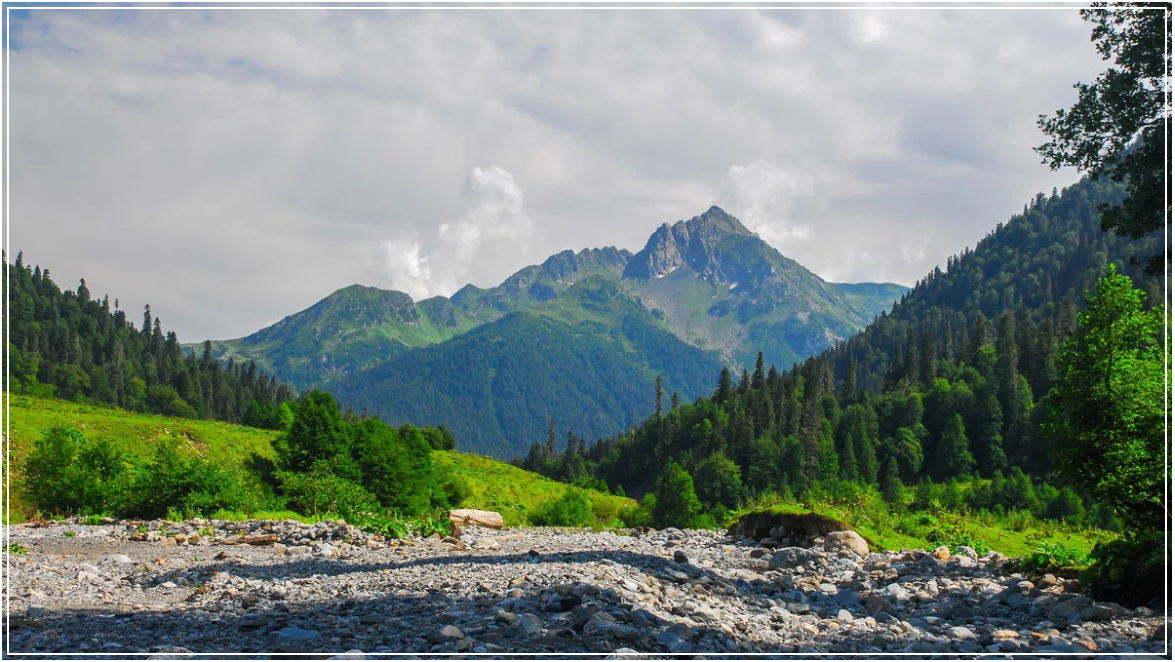
The sound of forest streams, the fresh scent of pine forests and majestic mountain peaks await you at Avadhara Resort. Located in the heart of the reserve, this climatic and balneological resort offers unique opportunities for total recuperation and recovery. The area is renowned for its pristine, unspoiled nature that will amaze you with its beauty. Here you can enjoy the clean air, saturated with freshness and vitality. The resort has no place for city dust and bustle - only peace and harmony with nature. Surrounded by mountains and covered with dense coniferous forests, the resort offers unique opportunities for outdoor activities and environmental exploration. You can go hiking or biking on scenic trails, enjoying the beauty of the landscape and the grandeur of the mountains.
A special feature of the resort is its mineral water springs, which are considered a real treasure of the resort. Water flowing out of tectonic clefts mixes with carbon dioxide coming out of volcanic rocks. As a result of complex physical and chemical processes, the springs are enriched with various beneficial substances that have a beneficial effect on the health and recovery of the body.
The resort, located in the center of the reserve, not only has a magnificent nature and healing springs of mineral water, but is also an important point for the study of the cultural heritage of Abkhazia. To the northeast, through the Anchkho Pass, stretches a road leading to the State Reserve Pskhu-Gumista, where there are mountain villages of Abkhazia - Pskhu and Dam-khutsy, which attract attention with their ethnographic uniqueness. The villages offer a unique opportunity to immerse yourself in the rich cultural heritage of the Abkhaz people. Here local highlanders still preserve traditional two-voiced songs, which are performed to the accompaniment of folk musical instruments, such as acharpani and apkhiats. The acharpani, which was a popular instrument among local shepherds, is still considered magical and symbolizes the wealth and historical heritage of the region. This unique instrument has survived only in the villages of the Gumista valley, and its sounds take us to the distant past of Abkhazian cultural heritage. Not only the musical heritage, but also the beliefs and religious practices of Abkhazia are part of the unique culture of this region. According to the local pagan religion, Abkhazia is considered a sacred place inhabited by seven holy places.
Located on the southern spur of the Main Caucasus Range, in the valley of the river Avadkhara, the resort is a true paradise for those seeking solitude and recovery surrounded by majestic mountains and nature. With its location, the resort has earned a reputation as a place where you can immerse yourself in unspoiled, pristine nature and enjoy the clean air that carries healing properties.
Abkhazia Resort is located at an altitude of 1700 meters above sea level, and its mountainous terrain gives this place a special charm. The climate is characteristic of the upper belt of the middle mountains, with long and cold winters, with snow cover and an average temperature in January reaching -6.7°C. Summers are short, moderately cool, and the warmest month is July, with an average temperature of 13.8°C. Annual precipitation is an impressive 2,480mm and average relative humidity is around 80%. The number of sunny hours per year reaches 1900. However, the resort does not only delight visitors with the beauty of nature and a favorable climate, but also offers unique therapeutic opportunities. On the territory of the resort there are springs of mineral water of various kinds, of which the spring "Ritsa № 4", which was researched by the famous balneologist Alexander Grigolia, stands out. This spring is enriched with useful substances and gives an impressive amount of water - 6 thousand liters per day. The mineral waters have different mineralization and composition, including carbonate, boric, iron, hydrocarbonate, sodium-calcium and magnesium-calcium mineralization. These waters are natural therapeutic factors that are used for internal consumption and passive climatotherapy.
See all resorts in Georgia
-
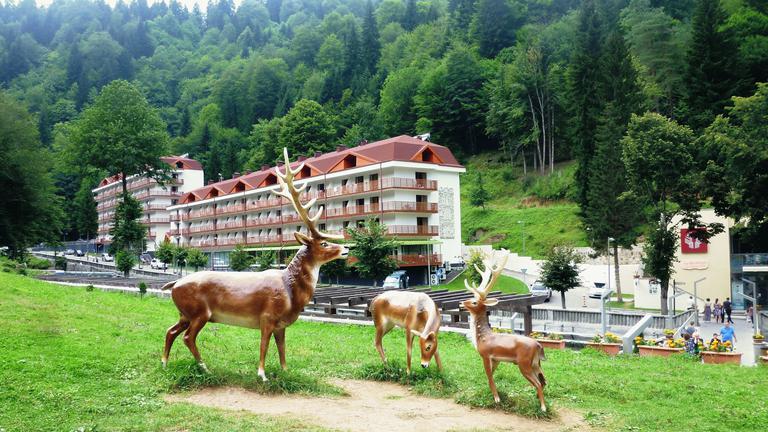
Sairme – deer area near Kutaisi
Resorts of GeorgiaSairme is one of the most popular resorts, created in order. so that you can relax and un…
-
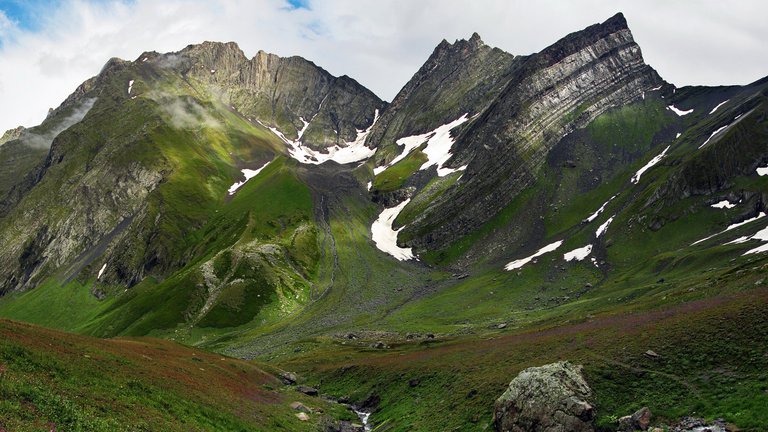
Racha Resorts
Resorts of GeorgiaRacha is considered one of the most beautiful places in Georgia and is distinguished by a…
-
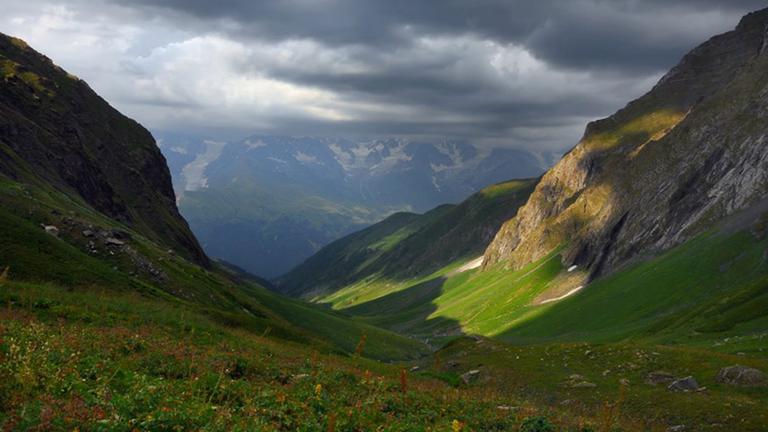
Hidikari
Resorts of GeorgiaHidikari Resort is located in a very picturesque place, on hills surrounded by a variety …
-

Lasichala
Resorts of GeorgiaThere are a huge number of various resorts in Georgia, with their own mineral waters and …
-
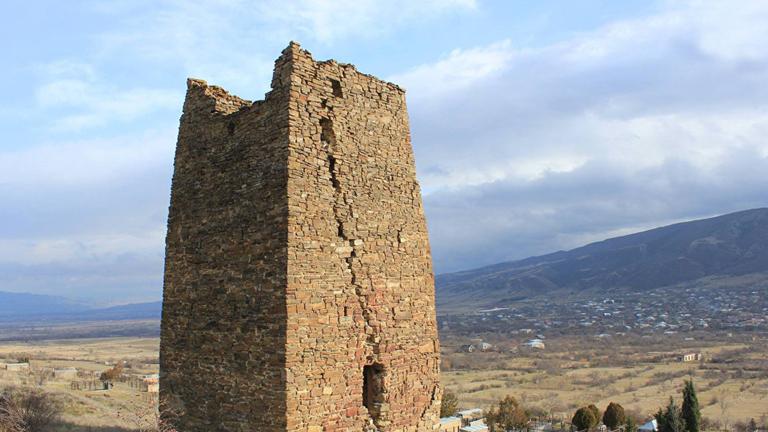
Khovle
Resorts of GeorgiaHovle resort is famous not only for its health benefits, but also for its historical sign…
-
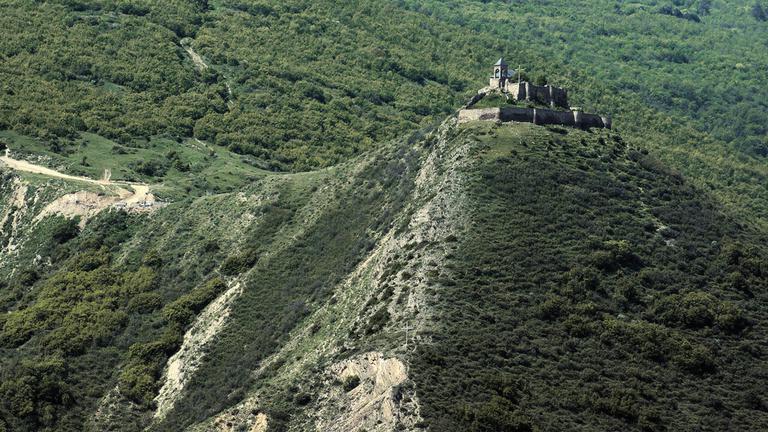
Gorijvari
Resorts of GeorgiaGorijvari resort is located on a mountain and is blown by clean and fresh mountain air. T…
-
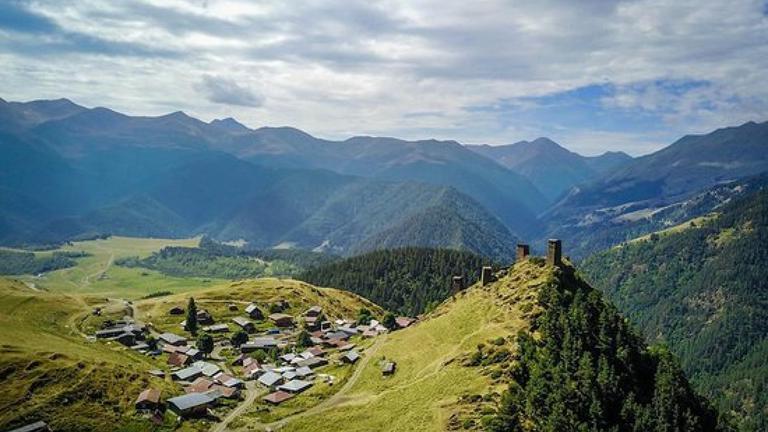
Abano
Resorts of GeorgiaAbano used to be a village and was important to the country. Nowadays, it is known for it…
-
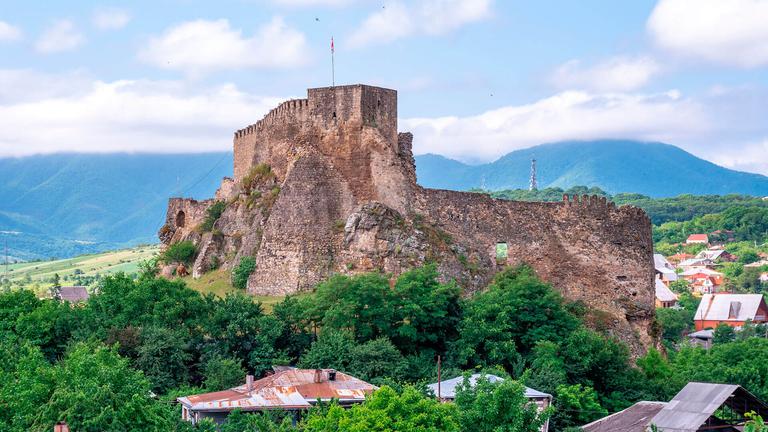
Surami
Resorts of GeorgiaThe peculiarity of the Surami resort is the focus on the treatment of children from vario…












33 comments
Log in to leave a comment
Курорт Авадхара напоминает место уединения с природой, с самим с собой, кто хочет отдохнуть от городской суеты, это место точно вас покорит своей необычайной красотой! Обязательно нужно его посетить! Уже представляю насколько там свежий воздух, глядя на фотографию!
Климат средних гор, зима долгая, холодная, снежная.
Исцеляются заболевания ЖКТ, сердца, железодефицитная анемия.
Ачарпани был популярным инструментом у местных пастухов, горцы приписывали этому инструменту магическую силу.
На территории Абхазии имеется семь святых мест, охраняющих их землю. Одно из них, гора Инал- Куба, возвышается над Псху.
В результате сложных физико-химических процессов, происходящих между водой и горными породами, источники обогащаются различными веществами и выходят на поверхность в более чем 20 местах.
Один из источников, исследован известным курортологом Александр Григолия, за сутки даёт 6 тысяч литров воды.